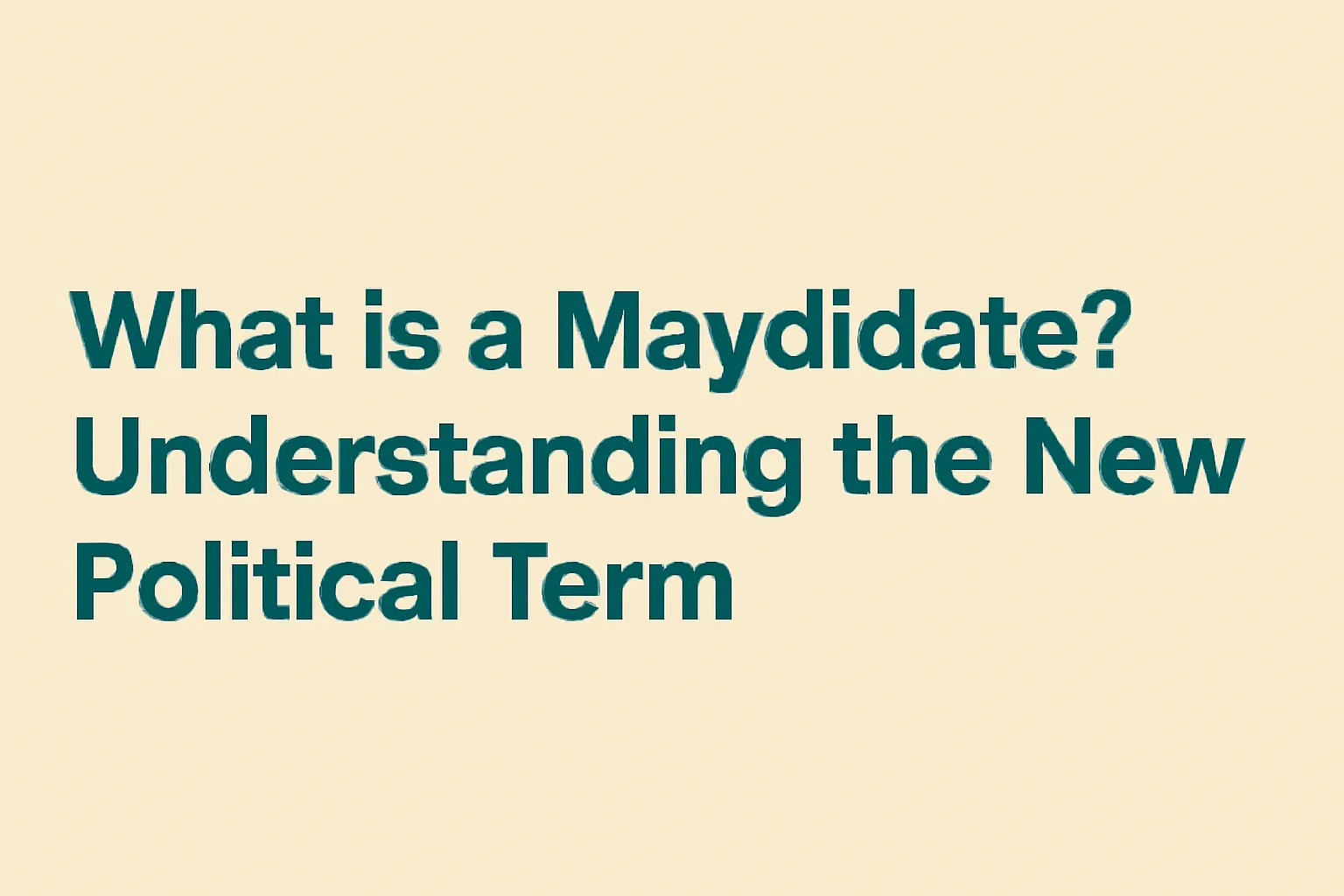Table of Contents
In contemporary politics, the term maydidate is becoming more prominent as a term to define people who are contemplating running for office but have not yet announced.
A blend of “maybe” and “candidate,” the term is used to describe an individual in the testing-the-waters stage of a campaign, to see if it is possible to run for office and if the support of the public is sufficient.
This stage is becoming more relevant with the requirement for potential candidates to evaluate their prospects carefully prior to embarking on a large-scale political campaign. This post will define the maydidate term, how and why it’s used, and its impact in contemporary political activity.
What is a Maydidate?
A maydidate is someone who is actively exploring the possibility of running for political office but has not yet made a formal declaration. They are in the early stages of decision-making, carefully considering whether a campaign is worth pursuing.
While they may engage in campaign-like activities, such as attending events and meeting potential donors, their communications are carefully worded to avoid announcing a formal candidacy.
Instead of saying, “I am running,” a maydidate might say, “I am exploring the possibility,” or “I’m seriously considering running.” This ambiguity allows them to assess public support, gather information, and evaluate if they have the resources to mount a successful campaign.
Read also: Can Teachers See When You Copy and Paste on Google Docs?
The Maydidate’s Position in the Political Spectrum
To understand the mayoral role better, it’s important to place it within the broader political involvement spectrum. Here’s a breakdown of the stages in a potential candidate’s political journey:
- Citizen: Engaged in politics but not seeking office.
- Potentially Interested Citizen: Shows interest in political issues but not yet considering running.
- Contemplating Run: Actively considering running but not yet taking formal steps.
- Maydidate: Exploring the possibility of running for office and gathering support.
- Candidate: Officially declares and starts campaigning.
- Elected Official: Wins the election and assumes office.
The maydidate occupies the stage between serious contemplation and official candidacy, reflecting the careful approach that modern political hopefuls must take.
Key Activities of a Maydidate
While a maydidate has not formally declared their candidacy, they often engage in many of the same activities as actual candidates. Here are some of the key activities a maydidate might be involved in:
Engaging in Exploratory Activities
A candidate will attend political events, meet with voters, and engage with potential supporters. They test the waters to see how their message resonates with the public, without formally declaring their candidacy. These events allow them to gauge interest and build relationships with key political figures and donors.
Carefully Worded Public Statements
One of the defining characteristics of a maydidate is how they communicate. Rather than committing to run, they carefully word their statements to avoid making a firm declaration. Phrases like “exploring the possibility” or “considering a run” are common, signaling that they are not fully committed yet.
Polling and Testing Public Opinion
A maydidate will often conduct polls, focus groups, or surveys to assess public opinion. These methods help them gauge how voters feel about the idea of their candidacy. If polls show strong support, it might push them closer to declaring their candidacy.
Building Networks
A maydidate begins to build a network of political supporters, donors, and advisors. By doing so early on, they can create a foundation of support if they decide to run. These networks provide resources, expertise, and political backing when they make their final decision.
Exploring Fundraising
Even if a candidate has not officially entered the race, they will often explore potential fundraising sources. They look into whether they have enough support to fund a campaign and if donors are willing to contribute. If fundraising looks promising, it could make the decision to run much easier.
Developing Tentative Policy Ideas
While a maydidate may not have a fully developed platform, they begin thinking about key issues they would focus on if they run. These policy ideas are usually broad and flexible, reflecting the fact that they are still in the early stages of their decision-making process.
Monitoring Media Perception
Throughout the exploratory phase, a candidate will closely monitor how the media covers them. Negative media coverage could influence their decision to run, while positive coverage might encourage them to move forward. Media perception plays a critical role in the candidate’s decision to declare.
Why is the May Term Important?
The introduction of the term maydidate is significant because it clarifies the stage between contemplating a run and officially launching a campaign. In today’s political climate, where campaigns require significant resources and preparation, it’s important to recognize this exploratory phase.
It allows potential candidates to assess public support, build networks, and test ideas before committing to a full-scale campaign.
The maydidate phase also reflects the strategic approach that modern political figures must take. Candidates today need to carefully evaluate whether they have the resources, support, and public interest to mount a successful campaign.
The maydidate phase helps manage expectations, as it signals that a person is not fully committed but is still actively considering the possibility.
The Future of the Maydidate Concept
As the political landscape continues to evolve, the term maydidate is likely to gain more acceptance. With rising campaign costs and increasing public scrutiny, potential candidates cannot afford to rush into a race without proper evaluation. The maydidate phase offers a more cautious, calculated approach to political involvement.
As more people become aware of the mayoral stage, it will help both voters and the media better understand where a potential candidate stands in their decision-making process. It adds clarity to the political discourse and helps separate serious contenders from those simply considering running.
Final Words
In Final Words, a candidate is a person who is exploring the possibility of running for political office but has not yet made a formal declaration. This stage is crucial in the modern political process, as it allows potential candidates to assess public support, test ideas, and build networks before committing to a full campaign.
By carefully worded statements and cautious engagement, maydidates provide clarity about their position without officially entering the race.
The term maydidate is an important addition to political terminology, offering insight into the evolving political process. As more people become familiar with this term, it will become a valuable tool for understanding the different stages of political involvement.
Whether you are following a local election or a national campaign, recognizing the mayoral phase gives you a clearer view of how candidates navigate their path to office.

